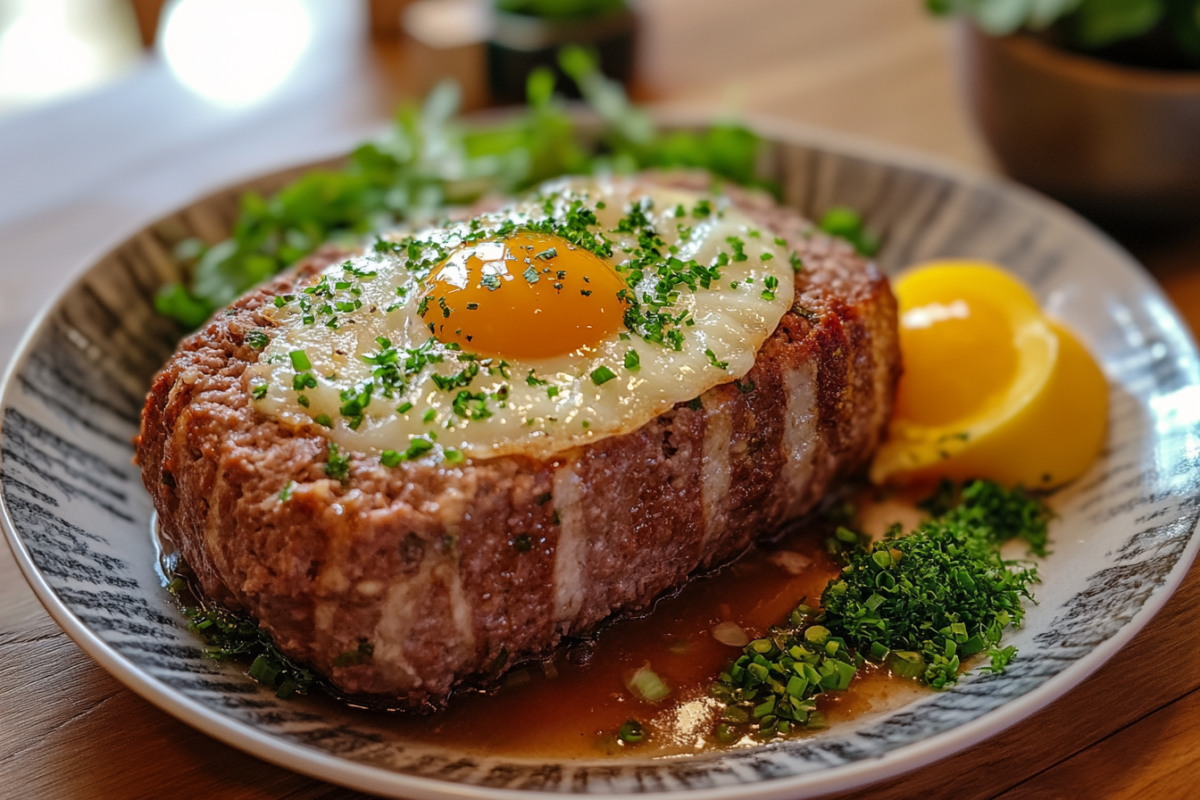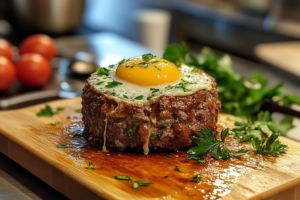Adding an extra egg to meatloaf can significantly alter its texture and binding properties, ultimately affecting the final result. This article explores how the number of eggs impacts meatloaf. We will also cover the benefits, potential issues, and some helpful tips for using an extra egg in meatloaf.
The Impact of Extra Egg to Meatloaf
When making meatloaf, eggs act as a key binder, holding all the other ingredients together. Therefore, the number of eggs used significantly affects its structure and consistency. Accordingly, using an extra egg often results in a moister and more tender loaf. However, there are potential issues that need consideration. Hence, it’s important to understand the effects fully.
What Does Adding an Extra Egg to a Box Cake Mix Do? – Create a comparison about how eggs affect different recipes like cakes and meatloaf.
The Role of Eggs in Meatloaf
Generally, eggs serve multiple, important purposes in meatloaf. First, they are a primary binding agent. Therefore, they help hold the meat and other ingredients into one cohesive mixture. Second, eggs add a significant amount of moisture. Consequently, this helps to prevent the meatloaf from drying out while baking. Finally, eggs contribute to the loaf’s overall texture. They ensure that the loaf is tender. In this case, adding an extra egg will further affect these functions.
How an Extra Egg Affects Binding
An extra egg provides additional proteins. Consequently, this extra protein helps to bind the meatloaf together even more effectively. The increased protein content will strengthen the structure of the loaf. In addition, it will often result in a loaf that maintains its shape well. Furthermore, if a meatloaf lacks the proper binding, it can easily fall apart after being sliced. Therefore, adding an extra egg can help to prevent this problem. It will make the loaf sturdier.
Moisture and Texture Changes With an Extra Egg
Enhanced Moisture with an Extra Egg
Adding an extra egg also significantly increases the moisture content in the mix. The liquid within the egg helps to keep the meatloaf moist during cooking. This is especially important because meat tends to lose moisture in the oven. As a result, a drier meatloaf will be less enjoyable to eat. Using an extra egg will often prevent a tough or dry final result. It ensures better moisture.
A Softer, More Tender Texture
Using an extra egg can greatly improve a meatloaf’s texture. Therefore, the increased protein within the egg creates a softer, more tender loaf. This is because the egg prevents the meat from becoming too dense or compact. Hence, the meatloaf will be more pleasant to eat. Therefore, adding an extra egg can contribute greatly to a more enjoyable texture. It will not be as firm and tough.
Potential for a Soggy Texture
However, it’s important to realize that adding too much egg can lead to a soggy texture. Therefore, if you use too many eggs, the meatloaf can become overly moist. This will result in an unpleasant, mushy consistency. It is essential to find the right amount of eggs for the best balance. Additionally, consider the other liquid ingredients in the recipe. This will help to keep the correct balance.
Extra Egg and Meatloaf Recipe Adjustments
When is an Extra Egg Beneficial?
Adding an extra egg to meatloaf can be quite beneficial in several situations. If your meatloaf recipe typically turns out dry, then adding an extra egg can provide the needed moisture. If you have a meatloaf that tends to crumble or fall apart after slicing, then an extra egg will enhance its binding properties. Also, if you prefer a more tender texture, adding more egg will usually help.
When to Avoid an Extra Egg
Conversely, there are instances when adding an extra egg might be detrimental. If your recipe already includes a significant amount of liquid ingredients, another egg could make the mixture too wet. Likewise, if you are using ground meat with a high-fat content, adding too many eggs could lead to a mushy, unpleasant texture. Therefore, it is important to carefully assess your recipe and existing ingredients before making changes. It’s best to proceed cautiously.
Balancing Liquids with an Extra Egg
When adding an extra egg, remember to consider adjusting the amount of other liquid ingredients. For example, if the recipe calls for milk, broth, or tomato sauce, you might want to use a little less. This helps to keep the correct moisture balance in the meatloaf. Additionally, it’s important to maintain the proper wet-to-dry ingredient ratio. As a result, the meatloaf will have the desired texture and consistency. Therefore, be sure to monitor the mix’s consistency before baking.
Common Meatloaf Problems and Extra Egg Solutions
Dryness and an Extra Egg
A common problem when cooking meatloaf is dryness. This issue often occurs if the ground meat is very lean. Similarly, it can result from overbaking the loaf. In cases like this, adding an extra egg can help. The added moisture will often help to prevent the loaf from drying out. Therefore, this solution is usually a simple and effective fix. It adds moisture without much extra effort.
Meatloaf Falling Apart
Another frequent issue is a meatloaf that falls apart when it is sliced. This problem is often caused by insufficient binding ingredients. Consequently, adding an extra egg can provide the extra protein needed to bind the mixture. Therefore, it will help hold all of the ingredients together better. As a result, the sliced meatloaf will stay intact, instead of crumbling. It will be easier to serve.
Dense and Tough Meatloaf
Dense and tough meatloaf is not usually very pleasing to eat. Therefore, this often occurs as a result of over-mixing the mixture. It can also be due to using too little liquid in the ingredients. Accordingly, adding an extra egg provides additional moisture. This helps to create a softer, more tender texture. Furthermore, it’s important to avoid over-mixing the ingredients. This will help to prevent the meatloaf from being too tough. Therefore, adding an extra egg also ensures a better consistency.
Tips for Using an Extra Egg Correctly
Start Gradually with an Extra Egg
When deciding to add an extra egg, it is best to start with just one. Then, carefully assess the consistency of the meatloaf mixture. If you think it still needs more moisture or binding, you can always add another. However, it is important to avoid overdoing it. Remember, too many eggs can cause a soggy meatloaf. Therefore, proceed slowly and cautiously when making adjustments to the recipe.
Mixing the Extra Egg Thoroughly
Make sure that the extra egg is mixed thoroughly into the meatloaf mix. Consequently, this will ensure that the protein is evenly distributed throughout the loaf. This, in turn, will provide better binding and a more consistent texture. Therefore, mix the ingredients until they are completely combined. The more thoroughly mixed, the better the texture will be.
Adjusting Baking Time with an Extra Egg
After you add an extra egg, you might need to adjust the baking time of the meatloaf. Because the loaf might be moister, it could need slightly longer in the oven to bake through. Therefore, it’s important to check it for doneness. Use a meat thermometer to be sure that it has reached the correct internal temperature. Accordingly, if necessary, adjust the baking time.
Benefits and Downsides of Extra Egg to Meatloaf
The Upsides of an Extra Egg
The primary benefit of adding an extra egg to meatloaf is that it provides improved moisture. In addition, it enhances the binding properties of the loaf, leading to a more tender texture. Furthermore, the added protein in the egg contributes to a better overall texture. Ultimately, adding an extra egg is often a beneficial addition to a recipe. It ensures a more enjoyable result.
The Potential Downsides of an Extra Egg
However, there are some potential downsides that need consideration. First, adding too much egg could cause the meatloaf to be too wet or soggy. Second, it could alter the flavor profile of the loaf slightly. Therefore, it is important to find a good balance when using an extra egg. The key is to know just the right amount of egg to use for the recipe. If you use too much, you can ruin the overall result.
Maintaining the Balance
Maintaining a good balance between all the ingredients is very important for a good meatloaf. The goal is to add just enough egg to improve the texture and moisture without making a soggy mess. Consequently, always assess the other liquids in the recipe. As a result, you will achieve a well-formed meatloaf with the right consistency. This makes it easier to serve and eat.
Exploring Egg Alternatives in Meatloaf
Binders Other than Eggs
If you are not a fan of adding an extra egg to meatloaf, you can use other options for binding. Therefore, consider using breadcrumbs that have been soaked in milk. Alternatively, you could use a flaxseed “egg.” This option is simply ground flaxseed mixed with a bit of water. These alternatives will often provide similar binding properties to using an egg.
Alternatives for Moisture
For added moisture, try using grated vegetables in the meatloaf mixture. Vegetables such as zucchini or carrots add moisture as they cook. Additionally, you could use finely chopped mushrooms. Furthermore, using broth or tomato sauce will also help to keep the meatloaf moist. Hence, there are many effective ways to incorporate moisture into the recipe. This allows you to change the texture and taste.
Combining Egg Alternatives
You can also use a combination of different egg alternatives for better results. For example, try combining breadcrumbs with a bit of extra liquid. You could also consider using some finely grated vegetables with a flaxseed “egg”. By combining these options, you will often achieve a texture similar to that of using an extra egg. Therefore, there are many ways to experiment with the recipe. You will find what works best for your specific preferences.
Meatloaf Flavor Enhancements and Additions
The Role of Seasoning
While eggs contribute to moisture and texture, seasoning is just as important for great flavor. Ensure that you’re using salt, pepper, and other seasonings liberally. This helps to enhance the taste of the meat. Herbs like thyme, rosemary, and oregano are great additions. Furthermore, a bit of garlic or onion powder will make a difference.
Adding Vegetables for Flavor and Moisture
Finely chopped vegetables not only add moisture, but they also contribute flavor. Onions, bell peppers, and carrots are commonly used. However, you can also explore other vegetables. Zucchini, spinach, and even finely diced mushrooms can enhance the meatloaf. Therefore, explore what tastes best to you.
Sauces and Other Flavor Boosters
Adding sauces or flavorings can enhance your meatloaf, too. Try a dash of Worcestershire sauce or a bit of soy sauce to add depth. A tablespoon of tomato paste can intensify the flavor. A little hot sauce can add a hint of heat. Explore a wide variety of flavors to discover your favorites.
Combining Flavor Enhancements
You can combine various flavour enhancements to create unique flavor profiles. Vegetables and sauces can be used together. Similarly, try adding herbs along with some sauces and seasoning. These combinations will help create the perfect meatloaf that suits your preferences.
Conclusion
Adding an extra egg to meatloaf can significantly affect the final result. While it often enhances moisture, improves binding, and creates a softer texture, too much egg can lead to a soggy loaf. Therefore, it’s important to maintain a proper balance of ingredients. Always start by making small adjustments. Carefully assess the consistency of the mix, and monitor it as it bakes. There are many egg alternatives if you don’t want to add an extra egg. By using these insights, you will be able to create a perfect meatloaf. It will be flavorful, moist, and structurally sound every time. Remember to adjust recipes to match your personal taste and desired texture. This will ensure that you always get the best results. In addition, carefully consider the ratios of all your ingredients. You will learn how to make the perfect meatloaf for yourself and your family. Ultimately, mastering meatloaf recipes takes practice, and it pays off greatly.
Frequently Asked Questions (FAQs)
What happens if I add too much egg to my meatloaf?
Adding too much egg can lead to a meatloaf that is overly moist and has a soggy texture. It can also affect the flavor and overall consistency. Therefore, it is crucial to stick to the recipe’s guidelines or to make minor adjustments gradually.
Does adding an extra egg make meatloaf more tender?
Yes, adding an extra egg can help make the meatloaf more tender. The added protein and moisture in the egg will often prevent the meat from becoming too dense or dry while baking. Thus, adding an extra egg will lead to a better result.
Can I use an egg substitute instead of an extra egg?
Yes, you can use an egg substitute such as flaxseed meal mixed with water. Soaked breadcrumbs or a cornstarch slurry can also be effective alternatives. These are all great ways to keep the loaf moist and provide a binding agent.
How many eggs are too many in meatloaf?
The number of eggs that are too many for a meatloaf depends on the specific recipe. However, a good general guideline is to start with one or two eggs per pound of ground meat. Therefore, adding significantly more than that could lead to an undesirable, soggy texture. It’s best to make slight adjustments as you learn what is right for your recipe.



